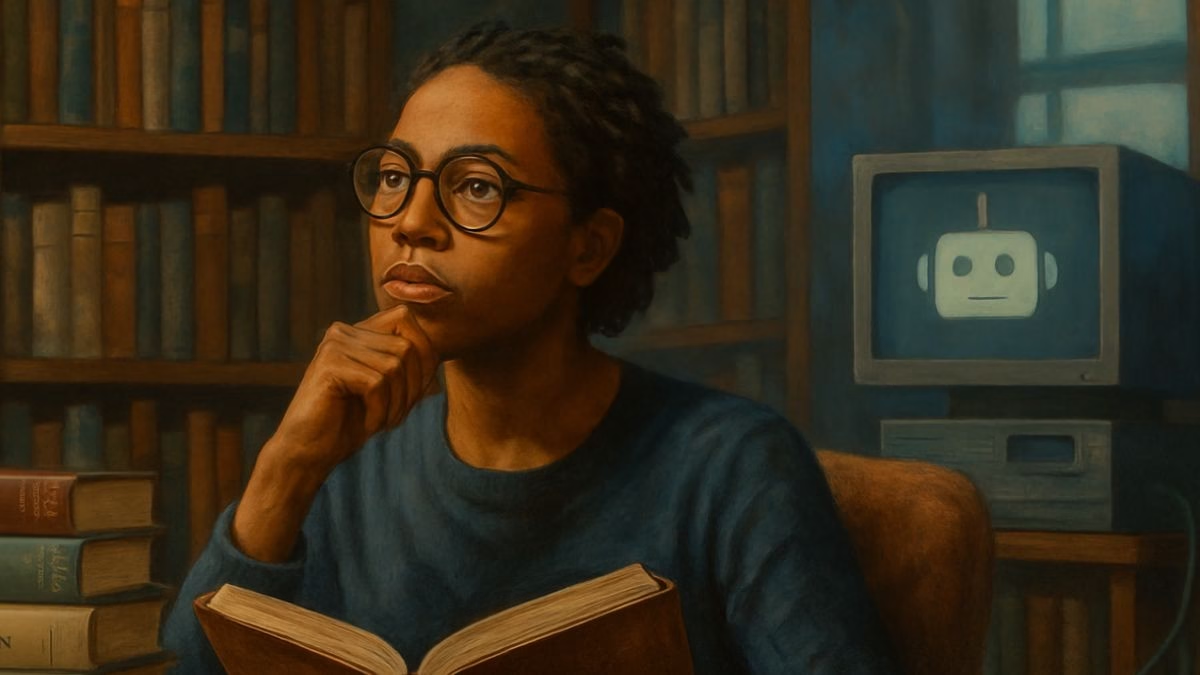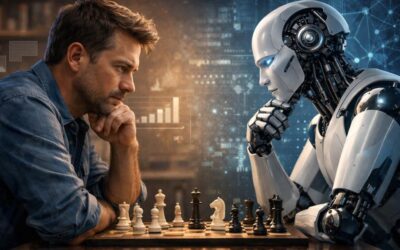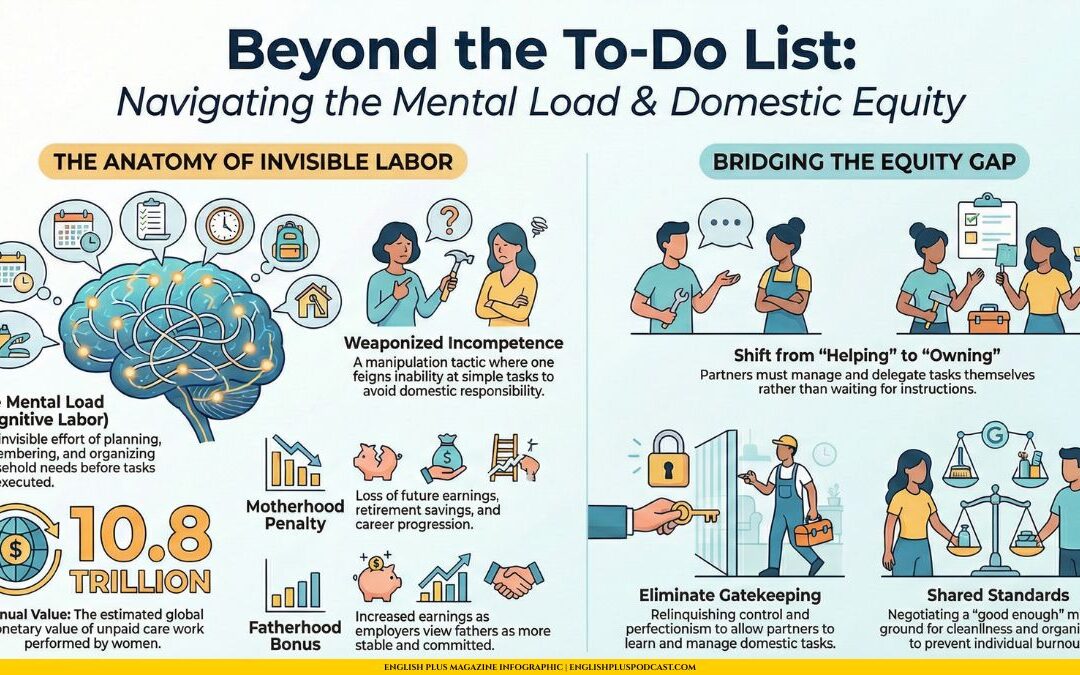Hello and welcome to English Plus Podcast. I’m your host, Danny, and I am so glad you’ve decided to spend some of your time with me today. This week, we are embarking on a new journey together, a new theme that is deeply personal to me and, I suspect, to many of you, even if you don’t realize it yet. The theme is ‘Literature and Us.’ Over the next few episodes, we’re going to explore the intricate, powerful, and often surprising ways that stories—from ancient epics to modern novels—shape our minds, our societies, and our very sense of self.
And we’re kicking things off with a big, bold question, one that feels more urgent today than ever before: Why does literature still matter in the age of AI?
It’s a fair question, isn’t it? We live in an era of unprecedented technological marvels. We have artificial intelligence that can write articles, compose music, create stunning works of art, and summarize a 500-page novel in a handful of paragraphs. Information is instantaneous. Entertainment is on-demand, delivered in perfectly calibrated, bite-sized chunks by algorithms that know what we want before we do. Our phones buzz with notifications, our feeds scroll endlessly, and our attention is the most valuable commodity on the planet.
In this whirlwind of data and distraction, the act of sitting down, shutting out the world, and losing yourself in a book can feel… well, a bit archaic. Quaint. Like churning your own butter or writing a letter by hand. With AI promising to streamline everything, to make knowledge acquisition frictionless, is there still a place for the slow, demanding, often difficult work of reading literature?
My argument, and the one we’re going to unpack today, is not just that there is a place for it, but that literature has become more vital, more essential, than ever. In a world increasingly optimized for efficiency, literature is our last great bastion of messy, beautiful, inefficient humanity. It’s the training ground for the very skills that algorithms can’t replicate and that our modern world desperately needs: deep empathy, nuanced critical thinking, and a profound understanding of the human condition. So, let’s get into it.
The Algorithm and the Experience
Before we dive deep, let’s first give AI its due. It’s an incredible tool. An AI can scan thousands of novels and identify thematic patterns in seconds. It can tell you the plot points of Moby Dick, explain the historical context of War and Peace, and even generate a sonnet in the style of Shakespeare about your pet cat. This is undeniably powerful. It’s the ultimate Cliff’s Notes, a firehose of information.
But here’s the crucial distinction: AI processes data; literature provides an experience.
An AI can tell you that in Fyodor Dostoevsky’s Crime and Punishment, the protagonist Raskolnikov is tormented by guilt after committing a murder. That’s a fact. A data point. But reading the novel… that’s something else entirely. Reading it means descending into the feverish, claustrophobic streets of St. Petersburg with Raskolnikov. It means feeling the sweat on his brow, the frantic pounding of his heart as he hides from his landlady. It means wrestling with his nihilistic theories, feeling the weight of his paranoia, and experiencing the slow, agonizing crawl towards confession and a chance at redemption.
An AI can give you the map. It can show you the route, the key landmarks, and the final destination. Literature makes you walk the path. It forces you to feel the stones under your feet, to smell the air, to get lost in the woods, and to feel the sun on your face when you finally emerge. The summary is not the story. The data is not the experience.
Think of it this way. You could have an AI generate a perfect chemical analysis of a gourmet meal. It could list every single compound, every flavor molecule, the precise temperature at which the steak was seared, and the exact pH of the wine reduction sauce. But would that information ever replace the experience of sitting down, lifting the fork to your mouth, and actually tasting the food? Of course not. Literature is the meal, not the recipe. And in our rush to consume information, we are in danger of forgetting how to savor the meal. This distinction is the foundation for everything else we’re going to talk about today. It’s why a summary can never replace a story.
The Empathy Engine
If there is one human faculty that feels most under threat in our polarized, fast-paced world, it’s empathy. True empathy. Not just sympathy, which is feeling sorry for someone, but the profound act of trying to understand what it feels like to be someone else. Our digital lives often work against this. Social media algorithms are designed to show us things we already agree with, creating echo chambers where opposing viewpoints are flattened into caricatures. We interact through screens, reducing complex human beings to avatars, profiles, and short, often angry, comments.
Literature is the direct, powerful antidote to this. It is, perhaps, the most effective empathy-generating technology humanity has ever invented.
How does it work? When you read a novel, you are performing a miraculous act of consciousness. You are literally stepping out of your own head and into someone else’s. For a few hours, you are not you. You are Scout Finch, a young girl in 1930s Alabama, trying to make sense of the ugly racism of the adult world in To Kill a Mockingbird. You don’t just observe her world; you inhabit it. You feel her confusion, her fear for her father, Atticus, her dawning, painful awareness of injustice. You are not told that racism is wrong; you feel its wrongness through the eyes of a child. This creates a kind of “moral muscle memory” that a news article or a statistic about prejudice could never hope to achieve.
Or consider a more contemporary example, Kazuo Ishiguro’s masterpiece, Never Let Me Go. The story is told from the perspective of Kathy H., a young woman who, along with her friends, grows up in a seemingly idyllic English boarding school. Slowly, horrifyingly, we the readers come to understand, along with Kathy, that they are clones, created for the sole purpose of donating their vital organs to “real” people until they “complete,” which is a euphemism for dying.
An AI could summarize this plot in a sentence. But reading the book forces you into Kathy’s consciousness. You experience her memories, her quiet friendships, her fleeting moments of love and hope, all under the shadow of a terrible, predetermined fate. The novel never screams about the injustice of their situation. Instead, it makes you live it. It makes you ask profound questions. What does it mean to be human? Do we value some lives more than others? By the end of the book, you feel an aching empathy for these characters who are, by their society’s definition, not fully human. And that experience inevitably leaks out into your real life. You might find yourself looking at the person serving you coffee, the stranger on the bus, or even a political opponent, with a newfound curiosity about the inner world you cannot see.
This is not just a fuzzy, feel-good idea. There’s science to back it up. Neurological studies have shown that when we read a compelling story, our brains react in much the same way they would if we were living the events ourselves. The same neural pathways light up. If a character is running, the motor cortex in your brain associated with the physical act of running shows activity. This is called “embodied cognition.” In essence, for our brains, reading about an experience is a very close substitute for experiencing it firsthand.
So when you read about a character navigating poverty, or heartbreak, or war, or prejudice, you are expanding your own repertoire of human experience. You are building a library of emotional and psychological perspectives inside yourself. This makes you a more compassionate, understanding, and frankly, a more interesting human being. AI can simulate conversation, but it can’t simulate experience. It hasn’t lived. Literature allows us to live a thousand lives, and in doing so, it makes us better at living our own.
The Critical Thinking Gymnasium
Let’s move on to our second pillar: critical thinking. This is another one of those skills we all claim to value, but our information environment often undermines it. We are encouraged to consume passively. We scroll, we swipe, we watch. The algorithm’s goal is to keep you engaged, not to make you think critically. It feeds you content that is easy, agreeable, and confirms your biases. It wants you to stay in the shallow end of the pool.
Literature throws you into the deep end. And it expects you to learn how to swim.
Unlike a straightforward news report or a textbook, great literature is rarely simple. It’s filled with ambiguity, unreliable narrators, symbolism, metaphor, and subtext. It doesn’t give you easy answers; it forces you to ask better questions. It is, in effect, a gymnasium for your mind.
Let’s take a classic example: George Orwell’s 1984. You can read a summary and learn that it’s a dystopian novel about a totalitarian state called Oceania, ruled by Big Brother. But reading the book is an active workout in critical thought. You have to grapple with the concept of “Newspeak,” a language designed to narrow the range of thought. You have to understand the terrifying logic of “doublethink”—the ability to hold two contradictory beliefs in one’s mind simultaneously and accept both of them.
When Winston Smith, the protagonist, looks at a party slogan that reads “War is Peace, Freedom is Slavery, Ignorance is Strength,” he isn’t just reading words. He is being manipulated. And as a reader, you are not just a passive observer. You become a detective of meaning. You have to ask: How does language control thought? How can truth be manipulated? How does power maintain itself? These are not abstract questions. As you read, you start to see the shadows of Newspeak and doublethink in modern political rhetoric, in advertising slogans, in corporate jargon. The book arms you with a new lens through which to view your own world. It trains you to spot manipulation, to question authority, and to value the clarity of language. An AI can define doublethink for you, but it takes the slow, immersive process of reading the novel to truly internalize its danger.
Or think about the structure of a good mystery novel. When you read an Agatha Christie story, you’re not just being told a tale. You are an active participant in an intellectual game. You are given clues, red herrings, and a cast of suspicious characters. Your brain is constantly working, forming hypotheses, evaluating evidence, looking for inconsistencies in testimony. “Wait,” you think, “he said he was in the library at ten, but didn’t the butler say the library clock was ten minutes fast?” You are practicing the core skills of analysis and deduction.
This is the polar opposite of passive consumption. This is active engagement. The author is challenging you, and your mind is rising to meet that challenge. This mental exercise has profound real-world benefits. The ability to weigh evidence, to consider multiple perspectives, to understand that things are often more complex than they first appear—these are the cornerstones of good decision-making, whether you’re serving on a jury, deciding who to vote for, evaluating a business proposal, or even just navigating a difficult conversation with a family member. Literature trains you to be comfortable with complexity and ambiguity, a skill that is increasingly rare, and increasingly valuable, in a world that craves simple, black-and-white answers.
The Human Condition, Unfiltered
This brings us to our final, and perhaps most important, point. Literature connects us to the vast, chaotic, beautiful, and terrifying tapestry of the human condition in a way that nothing else can.
AI and data science are brilliant at quantifying the world. They can produce charts and graphs showing trends in human behavior. An algorithm can analyze millions of data points and tell you the statistical probability of a marriage ending in divorce, the economic factors that contribute to social unrest, or the average lifespan of a person in your demographic. This is useful information. But it is sterile. It’s the “what” without the “why.” It’s the skeleton without the soul.
Literature gives us the soul. It explores the timeless, universal questions that have haunted and inspired humanity for millennia. What does it mean to love? How do we confront our own mortality? What is the nature of good and evil? How do we find meaning in a seemingly meaningless world?
These aren’t questions with easy answers that can be found in a dataset. They can only be explored through stories. When you read Leo Tolstoy’s Anna Karenina, you are not learning about the divorce rate in 19th-century Russia. You are plunged into the whirlwind of a passionate, all-consuming love that defies social convention and ultimately leads to ruin. You feel Anna’s ecstasy, her isolation, her desperation. At the same time, you follow the journey of Levin, a landowner searching for faith and a meaningful way to live his life through family, work, and connection to the land. The novel doesn’t tell you what to think about love or meaning; it presents these human struggles in all their messy, contradictory glory and lets you live inside them.
Or what about William Shakespeare? Why do we still read and perform plays written over 400 years ago? Because nobody has ever captured the raw, elemental forces of the human heart with more power or precision. When King Lear stands on the heath in the middle of a raging storm, stripped of his power and betrayed by his daughters, and screams his rage and grief at the heavens, we are not just watching a historical drama. We are witnessing a primal expression of loss, regret, and the fragility of the human mind. The language itself—the poetry, the rhythm, the imagery—is not just decorative. It is the meaning. It bypasses our rational brains and hits us square in the gut. No AI-generated summary could ever convey the devastating power of Lear’s cry, “Howl, howl, howl, howl! O, you are men of stones!” You have to hear it. You have to feel it.
Literature connects us not just to characters, but to all of humanity across time. When you read the ancient Epic of Gilgamesh and see a king grappling with the death of his best friend and his own terror of mortality, you realize that this fundamental human fear has not changed in over four thousand years. It bridges the gap between our modern, tech-saturated lives and the most basic experiences of our ancestors. It reminds us that for all our progress, we are still wrestling with the same fundamental questions. This provides a sense of perspective, of continuity, and of shared humanity that is a powerful anchor in our often-fragmented world.
The Case for Inefficiency
At this point, you might be thinking, “Okay, Danny, I get it. Literature is great. But who has the time? I can listen to a book summary on my commute. I can ask an AI to give me the key themes of Moby Dick while I’m making dinner. Isn’t that good enough?”
It’s a tempting thought. We are obsessed with efficiency, with life hacks, with optimizing every minute of our day. And in that context, reading a dense, 600-page novel feels like the ultimate inefficiency. And my response to that is: yes, it is. And that’s the whole point.
The inefficiency of literature is its greatest strength. The time it takes is not a bug; it’s a feature. The process of slowing down, of dedicating hours of your undivided attention to a single narrative, is an act of rebellion against the culture of constant distraction. It is a form of mindfulness. It allows your brain to switch from the frenetic, shallow-task-switching mode we normally inhabit to a state of deep, focused concentration. This is not just relaxing; it’s restorative. It’s a way of reclaiming your own attention from the algorithms that want to slice it up and sell it.
Getting the “gist” of a story is like getting the nutritional information off a cereal box. It tells you what’s in it, but it doesn’t nourish you. The nourishment comes from the slow process of consumption, of digestion. It’s in the wrestling with a difficult sentence until its meaning unfolds. It’s in the moment you have to put the book down and just stare at the wall for a minute to process what you’ve just read. It’s in the connections your brain makes, unprompted, between the character’s dilemma and a problem in your own life.
The struggle is part of the benefit. It’s like exercise. You don’t get stronger by having a machine lift the weights for you. You get stronger by feeling the resistance, by pushing through the difficulty. Literature is a workout for your emotional and intellectual muscles. And a summary is just watching someone else exercise.
So, as we stand here, in this dazzling, disorienting age of artificial intelligence, literature is not a relic of the past. It is a tool for the future. AI can handle the data. It can optimize our schedules, answer our queries, and streamline our tasks. It is a powerful assistant for the what and the how of our lives.
But literature is our guide for the why.
It teaches us empathy in an age of division. It hones our critical thinking in an age of misinformation. And it connects us to the deepest truths of our shared humanity in an age that can often feel dehumanizing. It reminds us what it feels like to be human, in all our flawed, questioning, and beautiful glory.
An algorithm can tell you a story, but it can’t make you feel one. It can process language, but it can’t transport you with it. It can analyze the human condition, but it has never lived it.
So the next time you feel overwhelmed by the noise of the digital world, the next time you feel like you’re just scrolling through a life of curated perfection, I invite you to try something radical. Pick up a book. It could be an old favorite or something completely new. Turn off your phone. Find a quiet corner. And for a little while, just be inefficient. Let yourself get lost. Let yourself be challenged. Let yourself feel something.
Because in the age of artificial intelligence, the most important thing we can cultivate is our own.
That’s all the time we have for today. Thank you for joining me for this first episode in our series, ‘Literature and Us.’ I hope it’s given you some food for thought. Next time, we’re going to get a bit more personal. We’ll be exploring how the stories we read in our youth—the books that find us when we’re 10, or 15, or 20—can shape our identity, our values, and the entire trajectory of our lives. It’s going to be a fascinating discussion.
Until then, this is Danny from English Plus Podcast. Take care, and perhaps, pick up a good book.










0 Comments